Despite being somewhat slack in the filmmaking department and being ruled by the cheesy monster and Suspiria-wannabe score of its horror film parts, The Dark is luckily many more parts - The Dark's greatest attribute is its sprightly, multi-plotline script, and, all pieces come together, it results in a wholly dapper, irresistible film, its laid-back, comedic surface further encasing a clever and surprisingly multifaceted narrative.
Equipped with the cracking and funny script, and the urbane setting of swinging Los Angeles, the film oozes with a smooth, debonair atmosphere that condensates in the air around its classy cast of 70s pop-culture cool cats: William Devane, Cathy Lee Crosby, Richard Jaeckel, Keenan Wynn, Biff Elliott, Casey Kasem - I don't know enough about 60s and 70s pop culture to know for sure if these guys are totems of 60s/70s entertainment, but they sure come off that way, and, skimming their IMDb credits, it shows they were in much modish TV-glam shit around that time (... Love Boats and Mission: Impossibles, comedy hours and Disco Hawaii Five-0s... Wonder Woman and Casey Kasem speak for themselves) and their glamor and personality surely rubs off on The Dark.
A scene in a swinging L.A. restaurant, with Cathy Lee Crosby and Will Devane soaking and moving about in the swanky atmosphere:
In a nutshell, the film is about a string of grisly murders that begin occurring in the Los Angeles-Santa Monica area. On the case are: hero William Devane, heroine Cathy Lee Crosby, the cops Richard Jaeckel and Biff Elliot, and the medium Jacquelyn Hyde, who begins the film foreseeing the death of a young playboy and wannabe-actor who approaches her at a yacht party, his future death providing the ticking-clock for the film.
The screenplay is, in fact, a most intricate concoction: it depicts an intermingling and cross-pollination of characters from a high-end cross-section of L.A. life (cops, newswomen, best-selling authors, mediums and ugly-inside pretty-boy actors who frequent aging Hollywood royalty houseboat parties), and explores the crossing wires of professions and professional ethics: William Devane is a lurid exploitation-fiction writer whose daughter is the first victim of the grisly serial murders. Cathy Lee Crosby is the media, a fierce yet still rather callow rookie newswoman who wants to elevate her former-Beauty-Queen image with a serious story, Keenan Wynn her ornery and salacious boss and tough-love mentor. Crosby less-than-scrupulously targets the grieving father (also, ex-murder-convict) Devane in her breakout story on the murders for the pompous-journalistic-bullshit angle that his writing stories of violence (particularly after committing one himself...) and shallow exploitation was essentially the karmic "asking-for" of his daughter's violent death.



Zooey: "Well, how was it?"
Jim: "It's good, it's good. Relax."
Jim: "Now what's the father [Dupree, played by William Devane] like?"
Zooey: "I couldn't reach him."
Jim: "Yeah, that can be tough..."


Zooey: "Jim, violence was my angle. Dupree makes his living off of violence! I read one of his so-called novels..."
Jim: "It was still rough on Dupree."

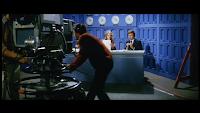




Zooey: "I'm sorry for his daughter."
Jim: "You saw the girl?"




"Hey look, Zooey, you can always go back to doing fashions in Beverly Hills..."



Zooey: "Nothing will ever make me go back to the minor leagues."
Jim: "Alright..."
(They split across the frame.)

Within the above paragraph describing merely one of The Dark's dramatic plot-threads, I have revealed the film's pointed yet light-hearted survey of personal dramas and clashing professionalism, a main one being between Crosby's reporter and Devane's writer: the strong-willed reporter's newly-gained ambition flying in the face of the celebrity author's newly-gained personal suffering, but only for them to later end up teaming up to stop the murders. Between Keenan Wynn's mentor and Cathy Lee Crosby's protege, Wynn is a total dinosaur of mustache-shaping* old-fashion and unaffected sexism, and Crosby's character is in fact less bright and less progressive than she aspires to be, but The Dark, in its wonderful weave of partnerships forming and continuing, posits to show how people can transcend their shortcomings and how the most unlikely relationships - between questionable mentors and struggling proteges, between cops and criminals, between celebrities and their negative press - can start off shaky but ultimately build into something positive. Crosby's relationship with her news anchor partner Jim (Jay Lawrence), as seen in the scene just above, is nurturing and even-handed -- not the usual mean snipping that news anchor partners are usually characterized with. Crosby is callow about her and her story's insensitivity to William Devane's character, but she is not totally unrepentant, and soon a romance blooms between the two. Although the greatest sympathy points lie with Devane's bereaved father character, he is still the film's most flawed person and failed life. The film is deliberately populated with all these two-faced (but positively so) characterizations, atypical relationships, and fallible-yet-redeemable main characters.




Sherm: "That is how you learn! Why do you think I sent you to Pasadena on those rose shows? Why do you think I sent you for those swim suit shows?"





"Half the male population of L.A. is staying up all night trying to figure out how to get in your pants!"
Wynn's first scene as "Sherm" above depicts him a loud-mouthed chauvinist, but his next and biggest scene proves him a warm father figure to Crosby, approving her piece for broadcast and then insisting he escort her through the parking garage to her car in this time of serial murders. Wynn's attempts to scare her in this latter scene - really to comfort her in a fraught, oppressive time (just as his attempts to discourage her in the scene above were really just attempts to discourage her from taking up the dangerous story of the beheading murders) - is one of the film's most endearing moments.
Sherm: "I wish they had more lights down here."
Zooey: "What's the matter, afraid of the dark?"
Sherm: "No, scared of what's in it."

Sherm: "RARGH!!!"
Zooey: *screams*
Sherm: "Ha!"
Zooey: "What's the matter, afraid of the dark?"
Sherm: "No, scared of what's in it."

Sherm: "RARGH!!!"
Zooey: *screams*
Sherm: "Ha!"

Zooey: "Real cute! I am scared stiff---!"
Sherm: "Well so am I! So am I! Oh, come on!"






* mustache-shaping
Richard Jaeckel and Biff Elliot play the cops (both hilarious, together utterly delightful, playing off each other like the best of sports - Jaeckel playing the irate one, Elliot playing the slovenly one who provides an hilarious moment where he smartly asks during a police meeting if the victim ate the skin sample found in her fingernails at a restaurant because the microscope slide of it looks like pizza), of a cloth both Keystone and hard-knock, full of contempt for the huddled masses of L.A. but clearly not above being as bumbling and hapless as the Angeleno protectorate they bark at. Their failure of an investigation to stop the nightly murders nicks away at their sense of profession and professionalism. Also, it turns out Devane's character, as an ex-convict, was locked up for alleged manslaughter a few years ago by Jaeckel himself. And so, we get another subplot of clashing heads, in which Devane gets out his resentment for the cop by mad-dogging Jaeckel throughout the film, taking up his daughter's investigation and one-upping the cops every step of the way. Here we have yet another intermingling of commonly uninvolved parties (civilian and authorities, in a rare even power relationship), and more intermingling that proves both a butting of heads yet ultimately a positive interaction for all: Devane wins his grudge match and beats Jaeckel to the monster, but Jaeckel ultimately saves their butts by his being on Devane's tail, calling in enforcements when they finally come face-to-face with the monster.
The Dark brims with positivity and lightness, depicting often complicated and sad, disappointing life, but always flipping the coin on the side of positivity: the cops are typical "pigs," often ineffective, but their purpose is indisputable; Jaeckel treats Devane like a criminal, but mutual respect, sympathy, and symbiosis simmers beneath the antagonism.
We are given at least three scenes where Jaeckel amd Elliot interact with the common people of L.A. - two of these establish a recurring scenario and visual, that of Jaeckel and Elliot standing across a police barricade that corrals a distinct sampling of L.A.'s unwashed masses. This potent dramatic/scene motif furthers the film's thematic motif of distinct spheres of people crossing: here, cops and the public under their wing. In one scene, this public is a gang of black ghetto youths,
Mooney: "Now you people here, you see anything? Hear anything?"
Bresler: "No volunteers as usual."
Youth: "Come off it, pig."
Moo: "Problem?"
Youth: "Yeah, when you guys going to show up on time?"

Mooney: "Maybe you'd like a badge. Maybe you'd like to be in charge, would ya?"
Youth: "Maybe. 'Cause it looks like to me you couldn't find your butt with both hands."
Bresler: "You cool it, son."

Youth: "Go on. Bust a nigga for being mouthy when a killer's loose!"
Bresler: "No volunteers as usual."
Youth: "Come off it, pig."
Moo: "Problem?"
Youth: "Yeah, when you guys going to show up on time?"

Mooney: "Maybe you'd like a badge. Maybe you'd like to be in charge, would ya?"
Youth: "Maybe. 'Cause it looks like to me you couldn't find your butt with both hands."
Bresler: "You cool it, son."

Youth: "Go on. Bust a nigga for being mouthy when a killer's loose!"
... in another, it is a raucous protest demonstration by alt-living liberals, which is also being covered by the news (that is, our intrepid reporter Cathy Lee Crosby, who crosses paths with our less-intrepid cops for the first time in this very scene -- those two parties' clashing of heads ending sublimely with Jaeckel vituperating at her camera: "This channel sucks.")...

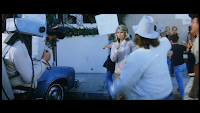

Zooey: "And that's the story of today's demonstration. This is Zooey Owens---"

Bresler: (to cameraman) "Alright, let's cut, cut! Let's turn that off!"
Zooey: (to cameraman) "Keep it running!"

Bresler: (to cameraman) "Turn it off!"
Zooey: (to cameraman) "I said run it."
Mooney: "This channel sucks."
(Later in the scene, the following puerile exchange occurs, painting in hilarious broad strokes the roles of Violent Cop and Bleeding-Heart Journalist:
Sherm: "It's the American way. Freedom of the press, free country!"
Mooney: "Well, every crackpot in town is reporting open graves!"
Zooey: "So, what's your theory?"
Mooney: "That we're not going to have to stick a stake through his heart - just a basic bullet between the eyes."
Zooey: "--- .38 caliber justice?"
Mooney: "You listen to me, sister. No one dead ever killed again, you tell that to these playmates of yours!")
.... and in one final moment of police/public congregation (their temple: the city), Jaeckel -- seemingly in almost a fit of compassion -- approaches, from behind a barricade, a group of ordinary pedestrians that gathers on yet another murder scene, and Jaeckel and the other cops provide a commentary on the peoples' fear. Mooney (Jaeckel) then betrays the cross-purposes of his personal self-respect and the safety of the people when he expresses his unwillingness to have the Department calling in the National Guard to help their failing investigation.

Mooney: "Yeah, excuse me, Captain, I want to take a closer look at these people..."



Speer: "They're about to go over the edge."
Mooney: "Yeah."
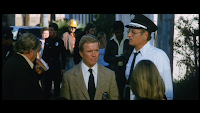
Bresler: "Scared sheep."
Speer: "With a wolf around them."
Speer: "If we don't come up with something, I'm going to have to ask for the National Guard."
Mooney: "That's going to make us look like Keystone Cops."
Speer: "If you're worried how you look, then come up with something!"
"I'm doing everything I can, Captain!"
"Well it's not good enough, Mooney!"

(Later in the scene, the following puerile exchange occurs, painting in hilarious broad strokes the roles of Violent Cop and Bleeding-Heart Journalist:
Sherm: "It's the American way. Freedom of the press, free country!"
Mooney: "Well, every crackpot in town is reporting open graves!"
Zooey: "So, what's your theory?"
Mooney: "That we're not going to have to stick a stake through his heart - just a basic bullet between the eyes."
Zooey: "--- .38 caliber justice?"
Mooney: "You listen to me, sister. No one dead ever killed again, you tell that to these playmates of yours!")
.... and in one final moment of police/public congregation (their temple: the city), Jaeckel -- seemingly in almost a fit of compassion -- approaches, from behind a barricade, a group of ordinary pedestrians that gathers on yet another murder scene, and Jaeckel and the other cops provide a commentary on the peoples' fear. Mooney (Jaeckel) then betrays the cross-purposes of his personal self-respect and the safety of the people when he expresses his unwillingness to have the Department calling in the National Guard to help their failing investigation.
Captain Speer: "Hey Mooney, I'm talking to ya!"

Mooney: "Yeah, excuse me, Captain, I want to take a closer look at these people..."



Speer: "They're about to go over the edge."
Mooney: "Yeah."

Bresler: "Scared sheep."
Speer: "With a wolf around them."
Speer: "If we don't come up with something, I'm going to have to ask for the National Guard."
Mooney: "That's going to make us look like Keystone Cops."
Speer: "If you're worried how you look, then come up with something!"
"I'm doing everything I can, Captain!"
"Well it's not good enough, Mooney!"

The film provides true milieu, and hangs this social milieu of cops and civilians, celebrities and monsters, onto a tangle of ethics and web of personal choices and actions, which continuously damn and redeem its revolving set of characters (the film is never unequivocal, which is what gives the film its wonderful levity and allows the characters their endearing moral layers; an exception, of course, is the set-in-stone damning to death of the rotten young actor by the medium Die Renzy).
Die Renzy: (she envisions his future death) "... There's no way I can save you."
Randy: "Save me? First you can't help me, then you can't save me!"
Randy: "Save me? First you can't help me, then you can't save me!"
Also touched on in the film is lawyers (Devane: "Listen, if there's one sort of people who fail to impress me, it's lawyers"), and a black middle-class family of the 2nd murder victim, the widow of whom is interviewed - exploited, one can take it there - by Crosby's reporter...

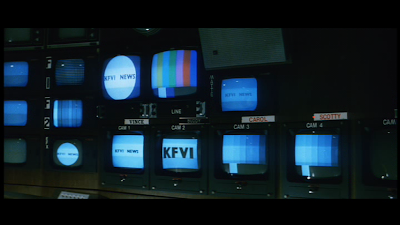
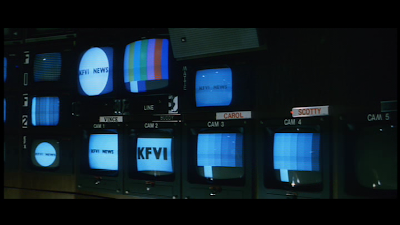







Zooey (voice in interview): "And no threats at all? No one who might've wanted to harm your husband?"
Zooey: "Sherm, you can't just listen to it. I want you to see it."
Sherm: "Take off the monitors. We'll run it online."
... and how about an honestly-living newsstand clerk and little person whom Jaeckel cavalierly rips off? (Although, actually, he is part of the irresponsible media, hawking his papers with the sensationalist call of, "Mangler's a Zombie!")
"Benji, give me the paper."
Every one of our protagonists is pretty shallow, but the film is still clearly on their side, and keen on their deserving to live. Only the young actor Randy (Jeffrey Reese) is a featured character who the film gladly admits will die by the end. He's clearly shallow, but add on to that a bad actor, and, revealed in his penultimate scene before his demise, a woman-hitter. The medium Die Renzy has to say of him: "He fancies himself another Barrymore - no, I take that back, he wouldn't even know the name. His idea would be one of those TV actors!"
Die Renzy, being the film's seer character, serves as a key chess-piece mover and catalyst in the film. Her visions - and her judgments - are always true and always of consequence. When she visits the cops, they laugh her off. Before she leaves, she tells them: next time she finds a clue, she "shall speak to someone less rude." And so, of course, with her information she next goes to Crosby - and thus Devane, the cops' investigatory adversary - and that duo actually act on her clue. Grieving father, 1+, Cops, 1-.
Die Renzy is not left off the hook herself, though. A leisured and indulgent figure, relic of a worthlessly extravagant and flamboyant life, she is brought to task herself by the end of the film. When we see her in public, she is a puffed-up Hollywood clairvoyant and haughty personality, who gives her life-and-death information only if she is pleased by her reception (in her scene with the cops described above, her ego trip seems just as important to her as the prevention of any murders). The film takes her down pegs in at least two scenes that importantly take place inside her luxurious Hollywood home, revealing her in all her pampered lethargy. In the first of these scenes, she lazes about in a haze of smoke, watching TV and feeling it upon herself to condescend to sports fans - a completely different sphere of people from her, adding another point to the film's expanding survey of how self-interested parties of the world butt heads while matters of importance are submerged into a world of competing egos:
Zooey (on TV): "So tragically, the too-brief life of Shelley Warner came to an end. And that her father paid a heavy debt for an act of violence..."
Jim (on TV): "Thank you Zooey. Now after this brief time-out, we'll be back with Sports."
Jim (on TV): "Thank you Zooey. Now after this brief time-out, we'll be back with Sports."
"Sports... don't they know it will happen soon again?"
In the second scene, a haggard-appearing Die Renzy senses an occurring murder and seems to become suddenly aware, while peering into a mirror, of the possibility she could very well be one of those beheaded victims herself:
The next time we return to Die Renzy's home, her house is besieged by a terrible supernatural windstorm, which causes her to have a stroke. The last we see of her - when William Devane tracks her down to her house and finally faces her directly - she is a stricken figure, her once haughty, made-up face contorted in post-stroke paroxysm.
The Dark is filled with all this dramatic continuity, buoyancy, and subtle humanity. A one-off scene shows Devane picking up a burger at a drive-in restaurant, the scene's purpose only as a graceful and melancholy set-piece showing Devane's paternal instincts kicking in as he fusses over the young waitress and her inability to wear a jacket in the cold. The scene is punctuated at the end with a presentational dolly-back and boom-up of the camera to a grandiose wide of the car he sits in -- a punctuating of the humanity and melancholy on display in this simple, single-shot dialogue scene.



"Thank you. Cold?"
"A little bit."
"You should wear a sweater."
"My boss won't let us. He says it's bad for business."
"How old are you?"
"Almost eighteen."
"You go to school?"
"Are you a cop or something?"
"No, why?"
"My dad says I shouldn't talk to strangers. He says it isn't safe."
"Well, your dad's smart."
"It's all those killing he's afraid of."
"Are you afraid?"
"Not really."
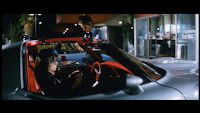

"Well, you should be."







Really love that above scene.
The film also has strange, unincorporated mystical elements (unincorporated in how they mix strangely with this very 70's, contemporary film, set in a very materialistic place) - these elements mainly involving the medium, whose psychic interaction with the beast results in such things like that aforementioned supernatural windstorm, brought about by, I suppose, mere manifested psychic turmoil.
Her premonition of the vain young actor's death is constantly referred to as fate, and accordingly, his death - with mordant karmic, slightly scriptural, implication - is never, ever, suggested as being preventable: his purpose only being as sacrificial goat for the cops and all involved parties to track in order to zero in on the monster.
"No one can stop it. He will die."

(See above shot and below shot - between these two shots occurs a "breathey," distorting rack focus from Die Renzy to Richard Jaeckel. I am such a sucker for these "breathey," loud, very noticeable focus pulls.)






"But if you are alert, you'll be there to catch this killer before he decapitates half the city."

(See above shot and below shot - between these two shots occurs a "breathey," distorting rack focus from Die Renzy to Richard Jaeckel. I am such a sucker for these "breathey," loud, very noticeable focus pulls.)






"But if you are alert, you'll be there to catch this killer before he decapitates half the city."
Fate is further evoked when, in one scene, William Devane by chance crosses paths with the actor at a restaurant, even brushing shoulders and sharing eye contact with the boy:
Then there is the Blind Man, who appears at least twice in the film as an unknowing and unassuming harbinger of death, innocently crossing paths with victims within minutes of their demises. Made explicit in the film's final voice-over, the blind man represents the film's most airy themes regarding our actions in the face of fear and the world's violence (including that committed by ourselves): the blind are one's who do not always have to go in fear of the dark. The blind never have to go in fear for what they might see and what might harm them for seeing. They also, in their sphere of such perceived disadvantage, have less the opportunity to be butting heads with those around them in response to the fears of the world. The blind man is never in fear - not even in the moment where he unknowingly walks in front of the young actor's car, the actor completely drunk and primed to run anyone in front of him down. Unlike Die Renzy, who would surely be filled with even more contempt for the young man at the drunken display, the blind man lives with no fears, has no idea this reprehensible fellow is just about to run him over: he is free from the burden of engaging, almost divinely situated as being "above" the ideas of conflict and the selfishness inherent in conflict (combativeness and selfishness being traits all the other characters are guilty of).
The victims in the film all flee what they feel they might, and eventually, see. Keenan Wynn's surprising - and false - stalk sequence (which comes immediately after he sends Cathy Lee Crosby safely off in her car, a scene I captured in stills above) is commendable in its extra-narrative purpose to evoke fear, which is indiscriminate in the people it takes hold of. The fact that Keenan Wynn is not in fact being chased by the creature imbues this scene with great metaphorical, extra-narrative weight, and the way this moment follows the scene where he is revealed a warm, nurturing figure to Cathy Lee Crosby - and thus making him a character of sympathy and audience surrogacy (in his goodness) - makes the fear and vulnerability he is made to put on display here means of a point of reference for us. In just the previous scene with Crosby, Wynn's character shows his greatest attribute in his willingness to admit to his feelings of fear ("I am scared stiff!" He responds: "So am I! So am I!"). It is an attribute of kindness. Wynn becomes someone to relate to (for all who relate to kindness), and his great passion of fear he is made to show (and left gladly to survive) in this scene simply communicates the humanity found in feeling fear, vulnerability, and the willingness to sacrifice (for, in the film's sequence of events, he sends Crosby off safely only to have the possibility of movie-plot death be shucked off onto him).
The final push-in toward Wynn as he rushes frantically into the safety of the elevator - and the expression of outsized fear (also relief, as the elevator door closes) he puts on when he turns towards the camera - is a whimsical high-point in the film, a striking mirror on our own experiences (or imagined experiences) of fear. Wynn's character just recently having been endeared to us, he thus becomes deserving of his survival and the falseness of his fear. Even more the case, it is the sense of his sacrifice in being made to serve as example that shines as the point to this arbitrary stalk sequence. It is the high-appointed example of a vulnerable person and a kind person, seen as sublime positives coinciding with a display of sublime fear. That final moment of us peering into his petrified/relieved face (him practically staring at the camera/us/an imagined fear...) thus carries great visual poignancy, Sherm essentially taking on the fears of all of us kind and sacrificial enough to feel such things, functioning essentially a momentary cinematic purpose liken to Christ serving us our sins.
This can be seen in contrast to the young actor's death, who never senses the presence of a diabolical monster until the moment of his surprise death (but, ironically, a death scene we have already seen, and thus can care less about - the grand and most overarching middle finger to the young man's existence of gross self-importance). Accordingly with these very factors (that we've seen the death and know it is coming; that he never is aware of the presence of a terrible creature; and the fact we are not meant to sympathize with him at all), his death scene is very much meant to be the polar opposite of Wynn's "[non-]death" scene - which is a scene of a sublime act, nothing more (like it being an actual death scene), but nothing aesthetically less.
This moment may be my favorite in the movie, and, coming rather early in the film, was the moment I realized The Dark really had things on its mind:
But for all there is to love about this movie, there's still all the minutes of lazy montage, rote stalk sequences, and those lamentable laser kills, where the victims explode via superimposed firework footage. But The Dark stays watchable throughout, up to the highly amusing but clearly little thought-out climax: a breathless laser extravaganza and stunt-man-heavy display of explosives use, set in a creepy abandoned winery (located/filmed in my hometown, to throw you a useless fact).
Before I conclude, having listened to director John 'Bud' Cardos's DVD commentary, he states clearly that Hooper shot just up to three days then was replaced, and that none of his footage was used, in accordance to permissibility issues. I will provide no extra commentary.
But if you are into goofy/laid-back 70's genre flicks, I say The Dark deserves viewership. It is regarded as a big turkey due to its rather indisputable failure as a coherent horror film, and in failing to create a monster worthy of taking seriously, but there are humanistic textures, a rich, deep good-nature, and a whole helping of good-humor and scripted personality here that makes this, in my estimation, more worthwhile than in its being a goofy 70's genre flick.
'The Dark' - 5/10
















































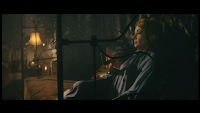



























































2 comments:
Who'd have thought? I've always heard this was dog shit. Even "Eaten Alive" champion Stephen Thrower, author of Nightmare USA, said it was hard to imagine what Hooper would've done with such "unpromising material."
People just can't appreciate a sprawling humanist farce.
But seriously now... it's easy to be above it, but I don't see why I would want to do that. Then again, reading reviews for it, I love it for reasons most people give fuck all about (like Stephen Thrower, I guess)... for example the cliche cops. People! You can do cliche right, you know!
Post a Comment